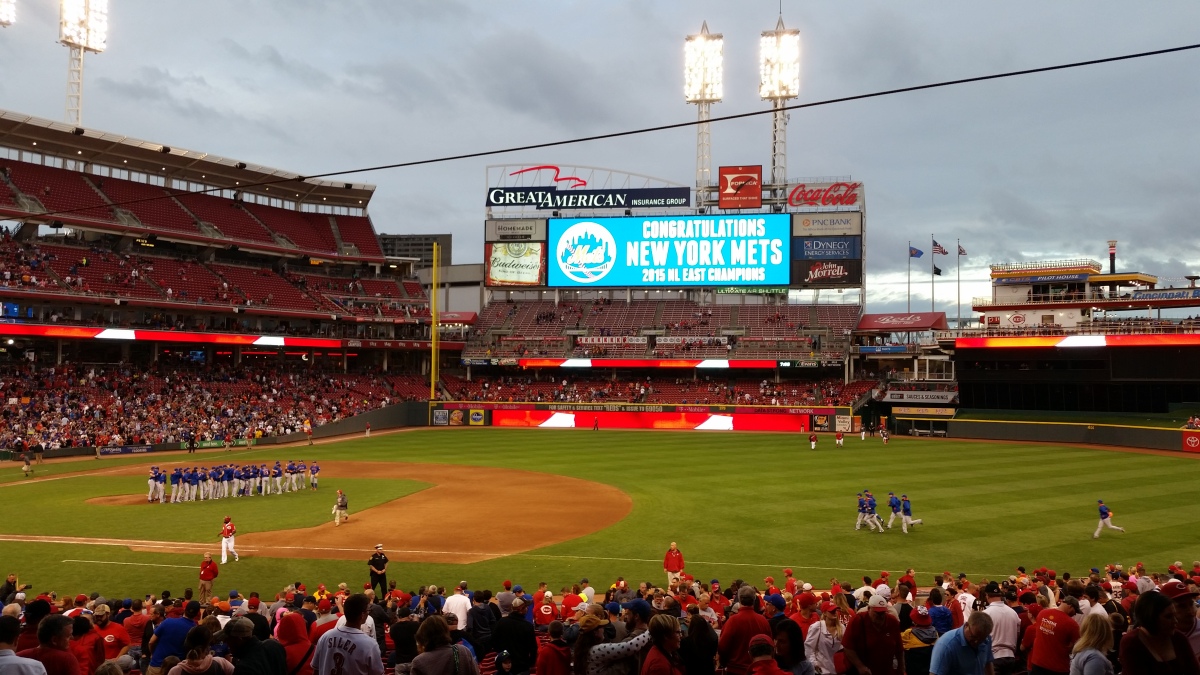When you stop paying close attention to a sport for a few years, you lose the feeling of its rhythm. I’d forgotten the tension of great baseball. The game is a balance between a slow build, and the instant release. Over the course of an at-bat, an inning, a game, a season, I can consider the back and forth at small and grand scales. No matter the prior, success can be raised (or razed) in the snap of a bat, or the flick of a ball.
In the top of the first inning, in Cincinnati Ohio, the visiting New York Mets had two men on base. The hometown Reds had earned two defensive outs. As I sat in the stands along the first base line, a man to my left donned a light windbreaker on torso and a Mets cap on head. “I’ve been a fan of the Mets since 1962,” he shared. Then he offered a fan’s ultimatum to the Cincinnati team. “Load the bases with Duda coming up. See what happens.” I heard it to be half-joke, half-threat.
And so the Reds took on the man’s challenge (however unwilling or unknowing they may have been). Cincinnati’s John Lamb walked Mets catcher Travis d’Arnaud, and the bases were loaded.
After all the work on both sides, the game was at a minor turning point. This moment, this plate appearance by Lucas Duda would validate someone. In a second, the ball flew from Lamb’s hand and struck the swinging bat. By the time the sound of the crack hit my ears, by the time my eyes gathered the evidence and delivered their report to my brain, the game was different.
The man on my left stood to applaud and reflected on his glee. “See! What did I tell ya?” Lucas Duda had hit a first inning grand slam home run in the National League East clinching game.
That day, Sunday September 26. It was the first Mets game I’d ever attended in person, and it just happened to be at Great American Ballpark. At this point it’s still the only one I’ve seen in the flesh. People will write odes to the season, to the Wilmer Flores game, to the fire-hot run from Yoenis Cespedes. They’ll probably focus on the reemergence of the Mets franchise, how the team finally found the bats to go on a tear. They may even reflect on the abundance of hair and skill from the pitching staff.
For me, the afternoon in Cincinnati was the high point. With Duda’s mighty swing, I witnessed nine years of futility wash away. I can’t speak for others, so I’ll only give my own hyperbolic interpretation: the fraction of a second when ball hit bat, all the the human torque and blunt force applied at once. As the ball ricocheted out into right field, it was the validation of a trip to southwestern Ohio, of my hope turned around in the second half of the Mets’ season.
The moment didn’t happen all at once, of course. The weeks of great play from New York (and some mediocre play from the rival Washington Nationals) led to this single instance. And yet it took a single game for the season to officially turn, for the Mets to clinch the division.
From that point, there was no turning back. However stressful I wanted to make the game, however much I was trained to anticipate a collapse, this specific version of the Mets was uninterested in my expectations. Matt Harvey rattled off more than six innings of great pitching. David Wright, my favorite Met, struck metaphorical hammer to nail with a triumphant home run. And Jeurys Familia completed the coup, finishing the Reds in the bottom of the 9th.
Tonight is Game Five of the World Series, and possibly the final game of the Mets season. For me, the release of that Duda grand slam will be what I remember most about this year. The abrupt end to the dream ascent is sad. The moment it all turned, the pitch that changed it all? I’ll keep that.
